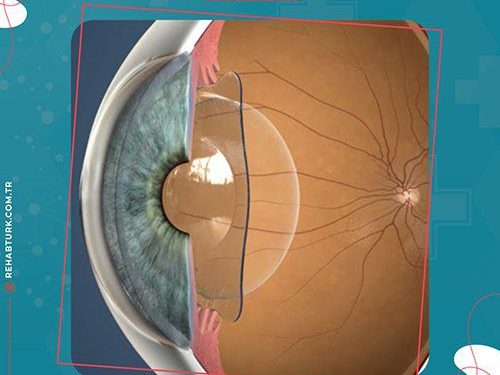Corrective lens implantation in Türkiye
Corrective lens implantation is a surgical procedure. During which the surgeon places the lens between the eye’s natural lens and the colored iris. The lens works with the eye’s lens to bend (refract) light onto the retina, resulting in clearer vision.
What is lens implant surgery in the eye?
They are artificial corrective lenses that are permanently implanted in the eye. These lenses are used to treat:
- Myopia (myopia)
- hyperopia (farsightedness)
- astigmatism
Corrective lenses are made of plastic and collagen called Collamer. It is a type of lens that is placed inside the eyeball, which is also called an “additional corrective lens” and stands for placing the lens inside the eye without removing the natural lens.
Although lens implant surgery is not necessary to correct vision problems, it can eliminate or reduce the need for glasses or contact lenses.
It is also a potential alternative for people who cannot have laser eye surgery. However, lens implants, like most procedures, are not suitable for everyone!
During lens implant surgery

It is necessary to visit the ophthalmologist a week before implanting corrective lenses. The doctor uses a laser to make small holes between the front of the eye (the anterior chamber) and the natural lens. This will prevent pressure and fluid buildup in the eye after the operation
The patient may also be given antibiotics or anti- inflammatory eye drops for several days before surgery.
The operation is performed by an ophthalmologist as follows:
- The patient lies on his back. Then a mild topical or topical anesthetic is given which will numb the eye so the patient will not feel anything.
- The patient may be given a mild sedative to help him relax, and he may be given an injection around the eye to temporarily prevent him from moving it.
- Then the surgeon cleans the eye and the surrounding area. The eyelids are opened with an instrument called an ophthalmoscope
- The surgeon makes a small incision in the eye and applies a lubricant to protect the cornea.
- The doctor inserts corrective lenses through the incision. The lens is very thin, so it may fold and then open in the eye.
- The surgeon removes the lubricant. Depending on the position of the incision, the doctor may close the incision with small stitches.
- Drops or ointment are placed in the eye, which is then covered with an eye patch.
The operation takes 20 to 30 minutes. Next, the patient is taken to the recovery room where he will be closely monitored for a few hours.
The doctor may prescribe eye drops or medication to relieve the pain. The patient can go home the same day but will need someone to drive him home.
The next day, there will be a follow-up appointment for the surgeon to examine the eye and check the status of the operation.
During the year following treatment, follow-up visits are arranged 1 and 6 months after surgery. Doctors usually order regular check-ups once a year.
Benefits of lens implants?
In addition to improving vision, it has many benefits:
- It can treat severe nearsightedness (myopia) that cannot be treated with other surgeries
- The lens is less likely to cause dry eyes, which is ideal if you have chronically dry eyes
- It is meant to be permanent but can be removed
- The lens provides great night vision
- Recovery is usually fast because no tissue is removed
- Unqualified eye surgeons are good candidates for corrective lens implantation.
Surgery risks
Although corrective lens implant surgery has been shown to be safe, it can cause complications such as:
- Glaucoma : It occurs if the size of the lens is large and positioned in the wrong way, which increases the pressure in the eye and necessarily leads to glaucoma.
- vision loss If you have had high eye pressure for a long time, you may experience vision loss
- Early cataracts . IOL implants can reduce fluid circulation in the eye, which increases the risk of cataracts. This can happen if the lens measures incorrectly or causes chronic inflammation.
- blurry vision Blurry vision is a symptom of cataracts and glaucoma. You may also have other visual problems if the lens isn’t the right size, such as glare or double vision.
- Cloudy cornea . Eye surgery reduces endothelial cells in the cornea with age. If the cells decline too quickly, the patient may develop a cloudy cornea and loss of vision.
- retinal detachment Eye surgery also increases the risk of the retina detaching from its usual position. It is a rare complication that requires emergency attention.
- eye infection This is also an uncommon side effect. It can lead to permanent vision loss.
- Additional surgery . You may need another surgery to remove the lens and correct related problems.
preventive measures
Corrective lens implants aren’t safe for everyone. You should speak to your doctor when considering the procedure to determine if it is appropriate.
Where surgery may not be a good choice if you:
- pregnant or nursing
- Under 21 years old
- You are 45 years of age or older
- You have a chronic disease
How can I book a corrective lens implant in Türkiye?

- Free medical support on the phone: You will have a dedicated representative for your health condition who is always ready to answer your questions.
- Free consultation with a specialist doctor: Your medical representative will consult with a number of doctors and hospitals to find the best possible treatments.
- Free travel visa arrangement: We will contact the embassy in your country to assist you in obtaining a visa to visit Türkiye.
- Free itinerary planning: We will create a schedule for your medical trip to Türkiye.
- Free translation of documents and reports: We will translate medical documents and reports into Turkish on your behalf.
- Free support and monitoring: We will monitor the stages of treatment and be by your side every step of the way.
- Free instant translation: We will be with you during the treatment stages to provide translation between you and the medical team.
- Free accommodation and transportation coordination: We will book accommodation for you and your companions in Türkiye, along with transportation services.
Contact REHABTÜRK doctors for more information about the procedure and to evaluate your medical condition.

